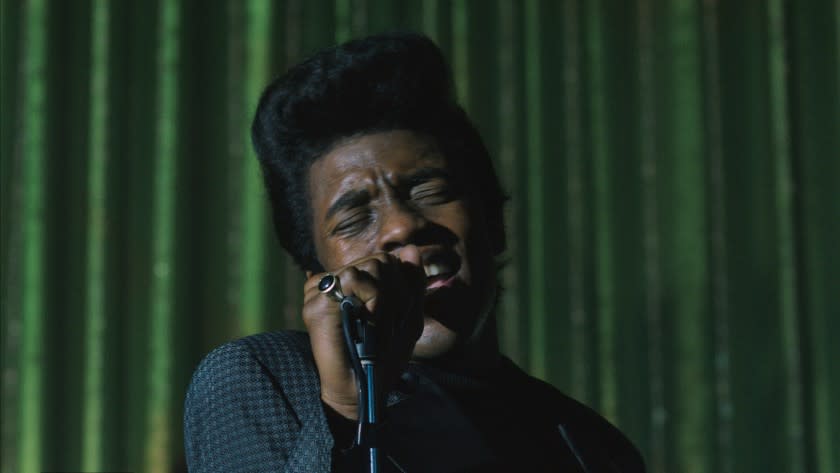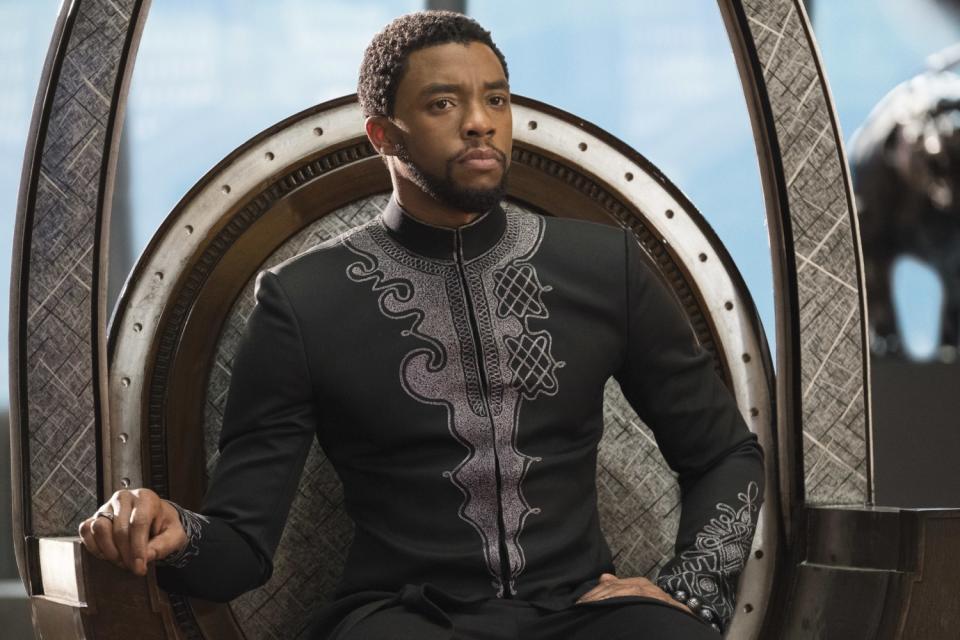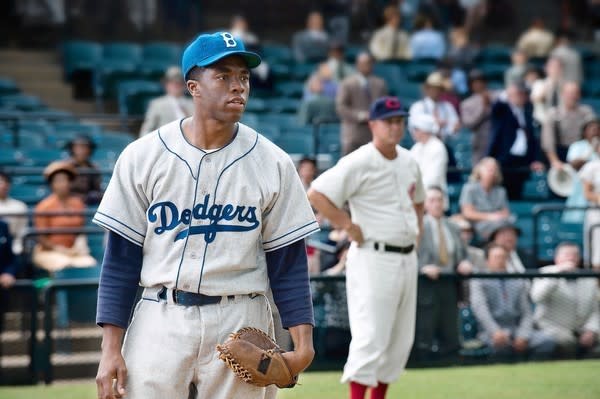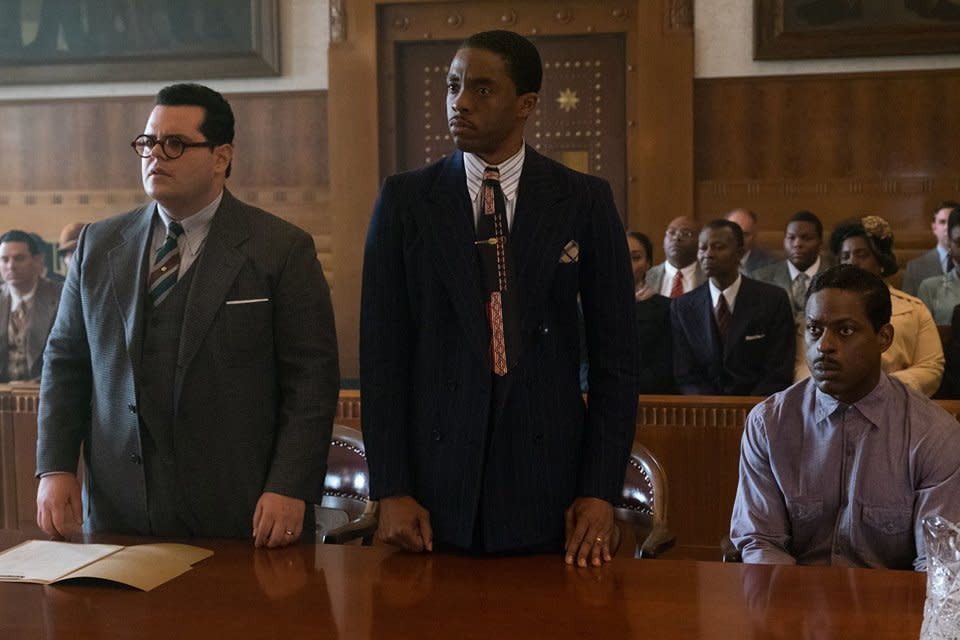Appreciation: Chadwick Boseman held the screen with power and unerring purpose

There are actors who move us for reasons that go beyond the simple matter of their talent — and Chadwick Boseman, to state the obvious, was an extraordinarily talented actor. His eyes could hold a closeup with enviable ease; his voice, whether adopting a James Brown rasp or a Wakandan accent, could croon and cajole you into submission. He commanded the screen with immense charm, protean skill and uncommon grace, qualities that never strained to announce themselves; they seemed to flow out of him like water.
But it wasn’t just inner magnetism or sterling technique that made Boseman such a gift to the movies. It was the kind of confidence that could express itself in stirring courtroom arguments and fierce action sequences, yes, but did so even more eloquently in moments of quiet reserve. He was a movie star by stealth, an actor who could dazzle us on the surface and still hold something crucial in check, as if he were in possession of some deep and mysterious inner knowledge.
We now know that Boseman was, in fact, guarding a close personal secret: a four-year battle with cancer that came to light Friday with his death at the age of 43. The news struck a devastating blow to an entertainment industry already in turmoil; it was also an instructive reminder, in a world that feeds relentlessly on celebrity gossip, that some of the toughest wars are waged in silence. The rigors of an actor’s craft and the struggles of a body’s survival are very different things, though our movie love can sometimes dare us, against our better judgment, to reconcile the two — to try and make sense of the gap between the actor we love and the person we may think we know. And it seems clear that, on screen and off, Boseman had a particular genius for understatement, a genius that he wielded with unerring purpose.

Boseman coaxed forth heroes and legends from the pages of fiction and history alike: He was the mighty King T’Challa in “Black Panther,” but was also Jackie Robinson in “42,” Thurgood Marshall in “Marshall” and, in his most electrifying performance, James Brown in "Get on Up." How does a guy casually tackle one icon after another — Black men whose pioneering achievements reshaped the predominantly white worlds of professional sports, popular music, American government and Marvel superheroics — without seeming smug or self-aggrandizing? Without slipping into that danger zone where a performer’s ambition seems overmatched by a movie star’s ego?
If Boseman inspired the question, it was surely because his own career was the answer. He was one of those actors you knew would deliver a terrific performance, even if the movie itself wasn’t necessarily terrific. He could get you excited to see a movie; the mere presence of his name was often enough to inspire curiosity and goodwill. That’s a remarkable feat for someone who, on the evidence of his past films and the many that were still to come, was clearly just getting started. But then, roles that might have seemed the birthright of a more veteran actor had a way of coming to him early on.
Now there will be no more, and the movies that he leaves us with must shoulder a far greater burden than that of merely entertaining and edifying us. When life robs us too soon of an actor’s gifts, the greatness of their work can be a source of deep consolation and equally deep anguish. Sometimes the pain of a life snuffed out reverberates with unbearable force in the work itself, in the faces of characters who already seem lost to us, perhaps even marked for tragedy.

But unlike, say, James Dean or Heath Ledger (or rather, the high-flying Hollywood Icaruses to which they have often been reduced), Boseman wasn’t the sort of actor who excelled at displays of intense, self-destructive brooding. He wore his gravitas with ease and flooded the screen with wit, warmth and life. And yet there are scenes in his movies — hell, there are Boseman movies in their entirety — that will never play quite the same way now, because his death has so cruelly driven home their lessons: the urgency of Black activism and representation, the vulnerability at the heart of every hero, the thinness of the line between life and death.
Boseman died Aug. 28, the same day that Major League Baseball chose to observe Jackie Robinson Day because of the COVID-19 pandemic. (It’s usually observed April 15.) The commemoration of the athlete who broke the MLB color barrier was already freighted with particular resonance this week: It unfolded amid a stunning display of protest, especially across the sports world, in response to the police shooting of a Black man, Jacob Blake, in Kenosha, Wisc. The wrenching confluence of these events will surely send more than a few moviegoers back to “42,” the 2013 biopic that starred Boseman as Robinson and planted the actor firmly on the industry’s map.
That makes the picture significant, even if better ones were to come. Not unlike “Marshall” (2017), in which Boseman portrayed the young attorney who would become the Supreme Court’s first African American justice (and generated some delightful buddy-comedy repartee with Josh Gad), “42” tries to connect the systemic racism of a bygone era to that of a troubled present. In this they fitfully succeed, even if they remain too constrained by biopic conventions to allow Boseman to fully soar, to grant him the room he needs to fully explore his characters’ interiority.

It was the biopic that came in between, the Tate Taylor-directed “Get on Up” (2014), that showed us the full force of what we were dealing with: an actor capable of not only performing astonishing feats of mimicry, but also of sending the audience into full-blown rapture. Some of that rapture came from the exuberant physicality of Boseman’s Brown — the swagger in his step, the fire and fury of his dance moves, the cock-of-the-walk relish he takes in the spotlight. But it also came from the slyness of his frequent addresses to the camera, selling us completely on the illusion that this is Brown himself leveling with us, basking in our love for him and making wittily clear how justified that love was.
There is nothing else quite like “Get on Up” in Boseman’s pantheon of great performances. It was the star turn as revelatory act of possession, in which an actor of impeccable control gave himself over to reckless, untamed emotion, throwing caution but not technique to the wind. I’m certain there would have been more such performances had he lived, and that prospect is more painful than consoling to think about.
There also, of course, would have been a Boseman-starring “Black Panther 2,” a sequel to the phenomenally successful blockbuster that first delivered us into the fantastical African nation of Wakanda. The cries of “Wakanda Forever!” that greeted that movie’s reception in 2018 made immediately clear why this was something more than business as usual in the Marvel Cinematic Universe: We were transported by the depth and intelligence of the picture’s world building, and also by the figure of a monarch who knew that world was far bigger than him. Crucially, Boseman’s King T’Challa registers as something far more than a symbol of might, which is to say he is something less: thoughtful, soul-searching, sometimes goofy and always human-scaled. He is a faithful son, an affectionate brother and a man endearingly tongue-tied in matters of love.

And he is deliberately dislodged, at key instances, from the heart of his own narrative by his fellow Wakandans. Beautiful and authoritative as he looks in his vibranium-fortified royal regalia, Boseman might have been the most self-effacing of comic-book superheroes. He made that clear the one time I got to meet and speak with him, while moderating a post-screening Q&A with him and several of his “Black Panther” collaborators. He spoke about the preparations he undertook to play T’Challa, the way he treated the role of a fictional African king with as much rigor as he did his real-life alter egos. Mostly, though, he spoke about the writer-director Ryan Coogler and about his co-stars, like Michael B. Jordan; he expressed what it meant to work alongside people he loved and respected. He couldn’t have seemed less interested in claiming the spotlight, any more than he does in the movie itself: In “Black Panther,” heroism is a collective enterprise.
And yet there’s a single scene in which T’Challa does stand well and truly alone, and it leaves me a little shaken each time I see it, even in the reassuring knowledge that everything, at least in the movie, will turn out all right. It’s the fateful moment of his ritual duel atop the waterfall, in which he must confront his nemesis, Erik Killmonger (Jordan), after first having the gift of his superhuman strength drained away from him. The image is powerful precisely because it’s an image of power being willfully surrendered, as a matter of lawful justice and personal integrity. It’s now a wrenching reminder that, even as Boseman was shouldering one of the most demanding roles of his career, he was dealing off screen with an illness that would gradually drain the life from his own body.
The movies love to turn mortality into a game. T’Challa dies and lives to tell about it — not only in “Black Panther,” but also in the last two “Avengers” movies, in which he briefly succumbs to an apocalypse that can be reversed with the snap of a screenwriter’s finger. Stormin’ Norman, the brave and visionary American soldier at the heart of Spike Lee’s “Da 5 Bloods,” is not so fortunate. The movie, released on Netflix in June, isn’t the last one we’ll see Boseman in (he’ll next reunite with his “Get on Up” co-star Viola Davis in the August Wilson adaptation “Ma Rainey’s Black Bottom”), but his performance in it nonetheless strikes an overwhelming note of finality.

As Stormin’ Norman, Boseman appears only in a few of the movie’s 155 minutes, but those minutes are indelible. He is both the movie’s anchor and its ghost: Killed years earlier in Vietnam, he haunts the edges of the story from beyond the grave. To the comrades who insist on keeping his memory alive even decades later, he is a fearless leader (“our Malcolm and our Martin”), a loving friend, a wise teacher, a social conscience. The lessons he has to impart, rooted in the violence and upheaval of the civil rights era, resonate no less in the moment of Black Lives Matter. In a ’70s Vietnam flashback that feels as though it could have been ripped from a recent newscast, Norman seethes about his life back home, about seeing cops patrolling his neighborhood “like it’s some kind of police state,” he says. “I can feel just how much I ain’t worth.”
If it was impossible to watch “Da 5 Bloods” in June without feeling the real world pressing in, it is even harder to watch it now without thinking ever more deeply about Chadwick Boseman. His performance, fleeting but indelible, feels like a gift — not just to the audience, but to the actor himself. You could swear Boseman has never looked younger or more boyishly alive, due in part to the presence of his visibly older co-stars (Lee refused to digitally de-age his actors or cast younger counterparts for the flashbacks). And despite his relative youth, he gets to be, as he often was in his movies, a voice of impassioned wisdom, a bearer of sobering, galvanizing truths.
But Lee and Boseman don’t reduce Stormin’ Norman to a sanctimonious mouthpiece. He’s contemplative and engaged; he’s also a soldier clearly bent on having the time of his life before death takes him, a guy who knows that war is hell and is determined to make that hell count for something. Is that the image of himself that Boseman meant to leave us with? We’ll never know; like all great actors, he knew how to keep a secret. But right now, in our year of rage, despair and grief seemingly without end, it’s one way we ought to remember him: as a man who tempered despair with hope, whose very largeness of spirit awakens something deep and purposeful within his fellow travelers, like a fire passing from torch to torch.

